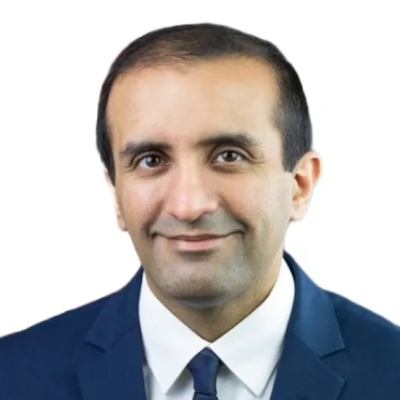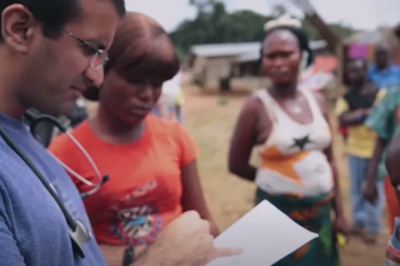Physician and public servant Dr. Raj Panjabi to speak at 2023 Gillings School Commencement
February 1, 2023
“We are not defined by the circumstances we face, but rather by how we respond to them. Public health gives us the tools we need to respond to the great challenges of the 21st century.” — Dr. Raj Panjabi

Dr. Raj Panjabi
Recognized by TIME as one of the 100 Most Influential People in the World, Raj Panjabi, MD, MPH, is a physician, professor, epidemiologist, entrepreneur and public servant. He serves as special assistant to President Biden and senior director for global health security and biodefense at the White House National Security Council. In this role, he supports the president and the national security adviser in coordinating federal policy to prevent, prepare for, and respond to epidemics and pandemics.
At the Gillings School’s 2023 Commencement celebration on May 13, Panjabi will offer insights from these roles and from his experiences as a medical professor, the third United States Global Malaria Coordinator and CEO of the nonprofit Last Mile Health.
Panjabi’s grandparents were religious minorities in Sindh province (present day Pakistan). Due to the British Partition in 1947, they fled to Mumbai and Indore in India. A generation later, his parents migrated from India to West Africa.
“I was born in Monrovia, Liberia, where I lived until I was nine years old,” Panjabi shares. “When civil war broke out in 1989, my family abruptly evacuated to Sierra Leone on a military cargo plane. We were resettled in North Carolina because my parents had friends in High Point who were willing to take us in and help us rebuild.”
His parents both found jobs in retail clothing stores, and Panjabi’s “summer camp” each year consisted of learning to be an entrepreneur alongside his father in a shop where Snoop Dogg and Dr. Dre blasted on the speakers. After nearly a decade in the U.S., he was offered a full scholarship to attend UNC-Chapel Hill.
“I am so grateful to the public for financing my undergraduate education,” he says. “Without that support, I wouldn’t have been able to afford to go into public service. I also attribute my children to UNC, because I met my wife when we were both first-year students.”
Panjabi became a mentee of [the late] Dr. Alan Cross, who was a professor in both the School of Medicine and the School of Public Health. On Cross’s recommendation, Panjabi traveled to rural Alaska the summer after his junior year and worked with community health aides who had been trained to provide primary health care to their neighbors.
“That summer set me on my life course,” he says. “It’s the reason I started med school in 2002 — I wanted to build organizations like the one I witnessed there. As a refugee, I was moved by the commitment of those health workers to serve their own communities. They inspired me to return to Liberia to do the same.”
During medical school at UNC, he returned to Liberia multiple times and founded Last Mile Health. At the time, the post-war country had only 50 doctors to serve more than 4 million people. Panjabi worked to recruit and train community health teams and outreach nurses to decentralize HIV treatment and narrow the rural health gap; he also launched the nonprofit’s first clinic.

Dr. Raj Panjabi (left) — alongside a community health worker and nurse — sees a patient in a mining community in the rain forest of Liberia.
He flew back to Chapel Hill just days before his graduation in December 2007 and, in the following years, crossed the Atlantic regularly while completing his medical residency, teaching at Harvard Medical School, caring for patients at Mass General Brigham’s health care system and helping to expand Last Mile Health to work in rural areas across several countries in Africa.
In 2017, Last Mile Health launched the Community Health Academy. The Academy program partners with governments to design, digitize and deliver trainings for health workers to better serve patients and for health leaders to better manage community health systems. To date, thousands of people around the globe have enrolled.
Over the years, Panjabi has served on several boards and advisory groups, including for the Skoll Foundation. In this capacity, he worked with Dr. Nancy Messonnier — now dean of the Gillings School — to reduce global health inequities in response to the COVID-19 pandemic.
These varied experiences inform Panjabi’s belief that the 21st century poses two great public health challenges: 1) Preparing for and preventing future pandemics; and 2) closing gaps in life expectancy, both within high-income countries and between high- and low-income countries.
“The first challenge may seem insurmountable — but recently, the U.S. government partnered with the Ugandan government and helped stop an Ebola outbreak in just about 100 days. Here at home, the COVID-19 vaccination campaign has saved an estimated 3 million lives (not to mention $1 trillion in health care costs). This shows what’s possible while reminding us there is still more work to be done to stop epidemics when and where they occur,” he says. “As for the life expectancy gap, especially between rural and urban populations, we already have proven solutions. At Last Mile Health, we decentralize care and bring health care to the people door-to-door — a community-based strategy that research shows decreases inequities and boosts the overall standard of care.”
These examples highlight the immense hope Panjabi finds in public health.
“I know graduates are already feeling the weight of the problems they will face in their careers,” he says. “As an immigrant, I deeply believe that we are not defined — as people or as professionals — by the circumstances we face, but rather by how we respond to them. A public health education gives us the tools we need to respond effectively, and now a whole new graduating class is prepared to fight for the health of all.”
Contact the UNC Gillings School of Global Public Health communications team at sphcomm@unc.edu.
